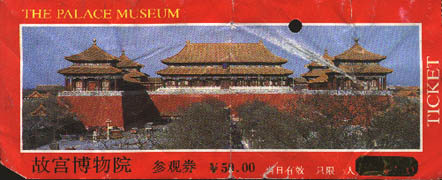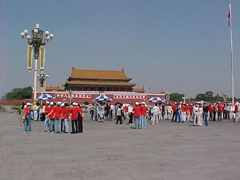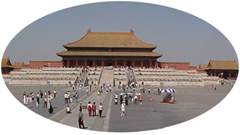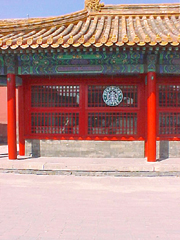|
Journal of a Sabbatical |
|||||||
|
|
|||||||
|
China Trip 2000 |
|
remind me I came here on purpose |
|||||
|
|
|
|
|||||
|
Quote of the Day: If your luggage is lost in Japan, you must go to look for it in Japan. - Japan Airlines' Beijing Office Today's Reading: The Story of the Stone (a.k.a. Dream of the Red Chamber) by Cao Xuequin
3 yuan mineral water
4 yuan mineral water Some Forbidden City Links: Forbidden City - the Internet Travel Guide Splendors from the Forbidden City -- in Oakland (through January 24, 2001) Intel Virtual Experience: The Forbidden City
Some Botanical Links: Institute of Botany, China Academy of Sciences - this is where I am |
|
The taxi ride from the airport to Xiangshan was long too. And eventful. I guess I'd forgotten the paragraph in the Lonely Planet guidebook about not hiring the rogue taxi drivers who pester you in the airport. Once I realized that Zsolt and István were not picking me up at the airport (apparently they didn't know I was coming today despite my having emailed both of them), I tried to get a taxi at the taxi stand outside the terminal but the first driver in line thought Xiangshan was too far and wasn't sure that's where I wanted to go. I went back inside and got someone at the information desk to write down "botanical garden" in Chinese, and also bought a map. Thus armed I was ready to head back to the taxi stand. But this driver who'd been trying to get me to hire him three times already by following me around the terminal intercepted me and I weakened. I showed him where Xiangshan was on the map and showed him my little "botanical garden" note. He assured me he could do it. Ha! So there we are in the highway when he suddenly pulls over to the shoulder. Oh shit! Is the taxi breaking down? Is he going to rob me? He asks for the map. which I hand him and again point to the botanical garden on the map. It's a very famous place and everybody in Beijing knows where it is except this taxi driver.
We reach Xiangshan and the Beijing Botanical Garden some two-plus hours later. Nobody there has any idea where the Institute of Botany or the National Herbarium might be. Even the ticket ladies at the botanical garden where you'd kind of think they'd know what's where and where the buildings are have never heard of it.
There's a guy riding a camel down the street. You don't see that every day. I struggle to stay awake until dinner. Watching the Olympics on the TV in my room helps once I figure out the remote is for the air conditioner and not the TV. I'm tired and disoriented and go through dinner in a haze. There were two enormous bowls of soup and three plates of barbecue pork. Then it was phone calls about my luggage. I had filled out the necessary forms at Narita airport and gave the address of the Institute of Botany, China Academy of Sciences, Beijing but the woman who took the report insisted I had to call them when I arrived here because I'm not staying in a hotel - or at least a hotel that I've ever heard of. So I try to call and discover I can't make direct long distance calls from my room, and I can't use my MCI card to call any country except the USA from China. I guess it never occurred to MCI that a customer might need to call Japan from China. So I tried calling JAL's Beijing office, thinking that all the airline missing luggage computers are connected. Apparently they're not. "If your luggage is lost in Japan, you must go to look for it in Japan." Indeed. But I wasn't going to dwell on the luggage thing here. Back to our story. After finally giving in to sleep and sleeping in 'til after 8:00, I'd like to say I'm well rested and less disoriented - and ready for action. It's hot and humid and I am sweating buckets in my only set of clothes. All is chaos here. Nothing is ready for the field expedition. Zsolt has arranged for one of the botanical graduate students to take those of us who have arrived (me, Mary, and Tomasz) to the Forbidden City. Sounds like a plan.  It's blazing hot in Tiananmen Square, which is a big open paved plaza with no shade anywhere. It's overwhelmingly big. Walking across it, I get vertigo. I feel like I'll fall off the edge of the world. I wish I had my hat to keep the sun off my head. Remind me to keep my hat in the carryon bag next time. I'm drinking bottled water almost constantly but keep sweating it out. The vendors in Tiananmen Square charge 3 Yuan for bottled water. Inside the Forbidden City, they charge 4 Yuan but the label has a nice picture of the palace on it. My comrades tease me because I want to save the label. Obviously the extra 1 Yuan is for the souvenir label so I'm keeping it. The Forbidden City (a.k.a. The Palace Museum) is almost too big to take in in one day. I was hot, dehydrated, disoriented, and jet-lagged but still managed to take in the wonder and strangeness of it all. Among my favorite rooms/buildings were the Hall of Clocks and the Hall of Ceramics. One of the emperors, I forget which one, collected clocks from all over the world. Many of them were made by famous European clock makers. Some were even commissioned especially for the emperor. They're ornate and sort of over done but I really got a kick out of the extremely detailed gold rhinoceros. The actual clock part of it seemed beside the point. The Hall of Ceramics covers the history of Chinese ceramics from ancient pre-Neolithic to 19th century. After all, the Chinese are the people who invented ceramics. That's why we call our dishes China. When I told my next door neighbor I was going to China she asked if I was going to get my dishes. Something about 1000-year old camel and horse figurines really impressed me through my stupor. The nine dragons screen, basically a wall covered with ceramic tile showing nine dragons hovering over the waves playing ball with pearls blew me away. Unfortunately, it was impossible to photograph it because by the time we got to it the sun was directly behind it. Besides that the lens on the Mavica isn't wide enough and the Pentax is in my luggage, wherever that may be. But I have the image in my head and that's good enough. It does seem odd that the people who did that magnificent wall have now surrounded themselves with gray concrete box-like structures.
All of us were very hungry. We had to work hard to convince Lin, the grad student in molecular biology of wheat (which he pronounces "wet") who was guiding us, that we didn't have to eat Western food and in fact would prefer to eat Chinese. His idea of getting Chinese food involved the aforementioned dry cakes from a snack bar. These are the driest cakes ever produced. I needed a swig of water for every bite of cake and even then I had trouble swallowing it. Zsolt and István could use these cakes to dry out the moldy specimens (the roof of the storage room leaked and 5 out of the 30 boxes of specimens were water damaged). We thought about bringing what we didn't eat back to the herbarium for this use but I think Tomasz disposed of them when we weren't looking.
Now even more hungry but slightly less dehydrated, we finally convince Lin that we can eat Chinese food. He takes us to a restaurant he knows and orders some salad-type dishes and some noodle dishes for us: zucchini with cardamom and red hot peppers I loved the spicy rice noodles a lot. Mary and Tomasz did not, so let me eat a whole lot of 'em. Back at the center of all things botanical in Xiangshan, Carol and Rosalie have arrived. Everybody goes out to dinner together to the restaurant next door to the guest house - our usual restaurant - which is somehow associated with the Institute of Botany. Many dishes arrived, one of which was the spicy rice noodle thing we had a lunch but much spicier. I loved it. Mostly we have some form of soup morning, noon, and night in this restaurant. Everybody had ideas about what I should do about my luggage. None of the ideas resulted in any forward motion. By now my clothes were so saturated with sweat they were getting moldy. The dry weather that Zsolt and István had assured me would dry anything I washed overnight, disappeared and we were left with humidity and dust. I can't stand moldy socks. I'm tired and cranky and just to top it all off, I get my period. Of course I've packed feminine supplies in my luggage. Fat lot of good that does me when my luggage is somewhere else unknown to anyone apparently at any airline on any continent. I did a great job of miming what I need to the girl at the convenience store across the street. She figured it out on only my third try. I think after dinner I told István I was going to just get on a train and go to Russia. Things are so chaotic and I'm so grimy and sweaty and dehydrated and really want to change my socks. Why I think it would be easier to change my socks in Russia I have no idea. Remind me I came here on purpose. |
|||||
|
Copyright © 2000, Janet I. Egan |
||||||


 What
seemed like a month but was really only two days passed on
airplanes and in a hotel at Narita Airport and there I was
in China with no luggage staring up at an enormous screen
constantly scrolling the immigration laws and the
consequences if any person or means of transport violates
the laws of the frontier. Do they have a big problem with
driver-less trucks crossing the border? Exactly how does a
means of transport violate the laws of the frontier without
a person driving it? And how do they round up these rogue
trucks to deport them? It was a long immigration line, what
can I say?
What
seemed like a month but was really only two days passed on
airplanes and in a hotel at Narita Airport and there I was
in China with no luggage staring up at an enormous screen
constantly scrolling the immigration laws and the
consequences if any person or means of transport violates
the laws of the frontier. Do they have a big problem with
driver-less trucks crossing the border? Exactly how does a
means of transport violate the laws of the frontier without
a person driving it? And how do they round up these rogue
trucks to deport them? It was a long immigration line, what
can I say? He
stops again to ask directions by flagging down other taxis.
He gets some from the second cab driver he flags down and
makes a frightening left turn onto a wide highway with no
lane markings and loads of speeding traffic going in the
opposite direction- uh, that would be towards us! I'm going
to die on a highway in China and no one will know where I
am! The driver doesn't even know where we are and we're both
going to be killed! I suppress my panic and try to look
unperturbed - maybe practicing for a return to a high-tech
management career if I survive this taxi ride. The driver
realizes his mistake and as he doesn't want to die where
even he doesn't know where he is, he pulls into a
service lane and flags down somebody on a bicycle to ask for
directions. Off we go again with the flow of traffic.
Altogether we stop six times for directions.
He
stops again to ask directions by flagging down other taxis.
He gets some from the second cab driver he flags down and
makes a frightening left turn onto a wide highway with no
lane markings and loads of speeding traffic going in the
opposite direction- uh, that would be towards us! I'm going
to die on a highway in China and no one will know where I
am! The driver doesn't even know where we are and we're both
going to be killed! I suppress my panic and try to look
unperturbed - maybe practicing for a return to a high-tech
management career if I survive this taxi ride. The driver
realizes his mistake and as he doesn't want to die where
even he doesn't know where he is, he pulls into a
service lane and flags down somebody on a bicycle to ask for
directions. Off we go again with the flow of traffic.
Altogether we stop six times for directions. We
drive around for awhile checking out the side roads. Finally
I spot the building that's shown on the Beijing herbarium's
entry on the Harvard web site index of world herbaria.
That's it! Sure enough we pull into the driveway and I see a
sign with the National Herbarium logo (gingko leaves and
gingko nut in a green circle on a white background). The
driver is relieved and relieves me of 600 yuan, which is the
rate for half a day, but I am so happy to have found the
place I don't even care that that's more than ten times what
the cab fare from airport to Xiangshan should be.
We
drive around for awhile checking out the side roads. Finally
I spot the building that's shown on the Beijing herbarium's
entry on the Harvard web site index of world herbaria.
That's it! Sure enough we pull into the driveway and I see a
sign with the National Herbarium logo (gingko leaves and
gingko nut in a green circle on a white background). The
driver is relieved and relieves me of 600 yuan, which is the
rate for half a day, but I am so happy to have found the
place I don't even care that that's more than ten times what
the cab fare from airport to Xiangshan should be. I
loved the palace garden. It's full of these weird rocks and
gnarly pine trees, some of them with white bark. The
walkways feature mosaic-like inlays of stones depicting
animals and plants. We ate dry cakes and drank 4 Yuan
bottled water by a beautiful lotus pond into which visitors
were throwing money - mostly coins but some people were
throwing small bills. I fell in love with the white bark
pine trees.
I
loved the palace garden. It's full of these weird rocks and
gnarly pine trees, some of them with white bark. The
walkways feature mosaic-like inlays of stones depicting
animals and plants. We ate dry cakes and drank 4 Yuan
bottled water by a beautiful lotus pond into which visitors
were throwing money - mostly coins but some people were
throwing small bills. I fell in love with the white bark
pine trees. Still
hungry and even more hot, tired, and dehydrated we left the
Forbidden City and entered
Still
hungry and even more hot, tired, and dehydrated we left the
Forbidden City and entered